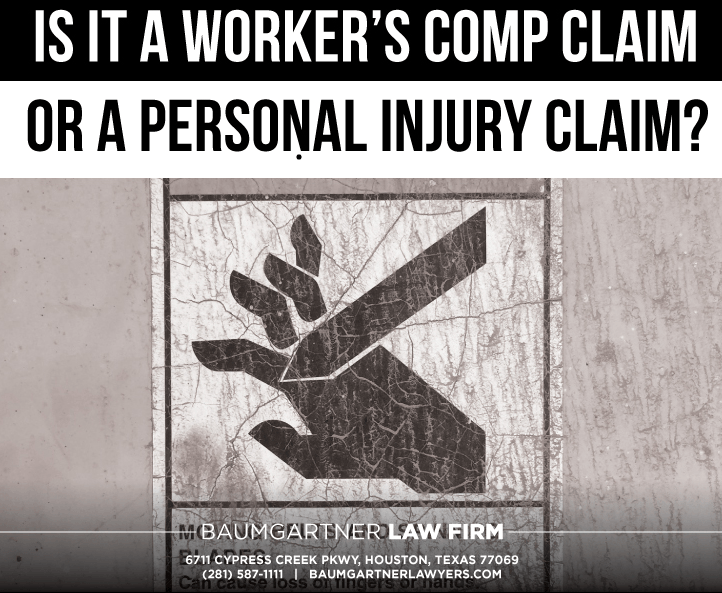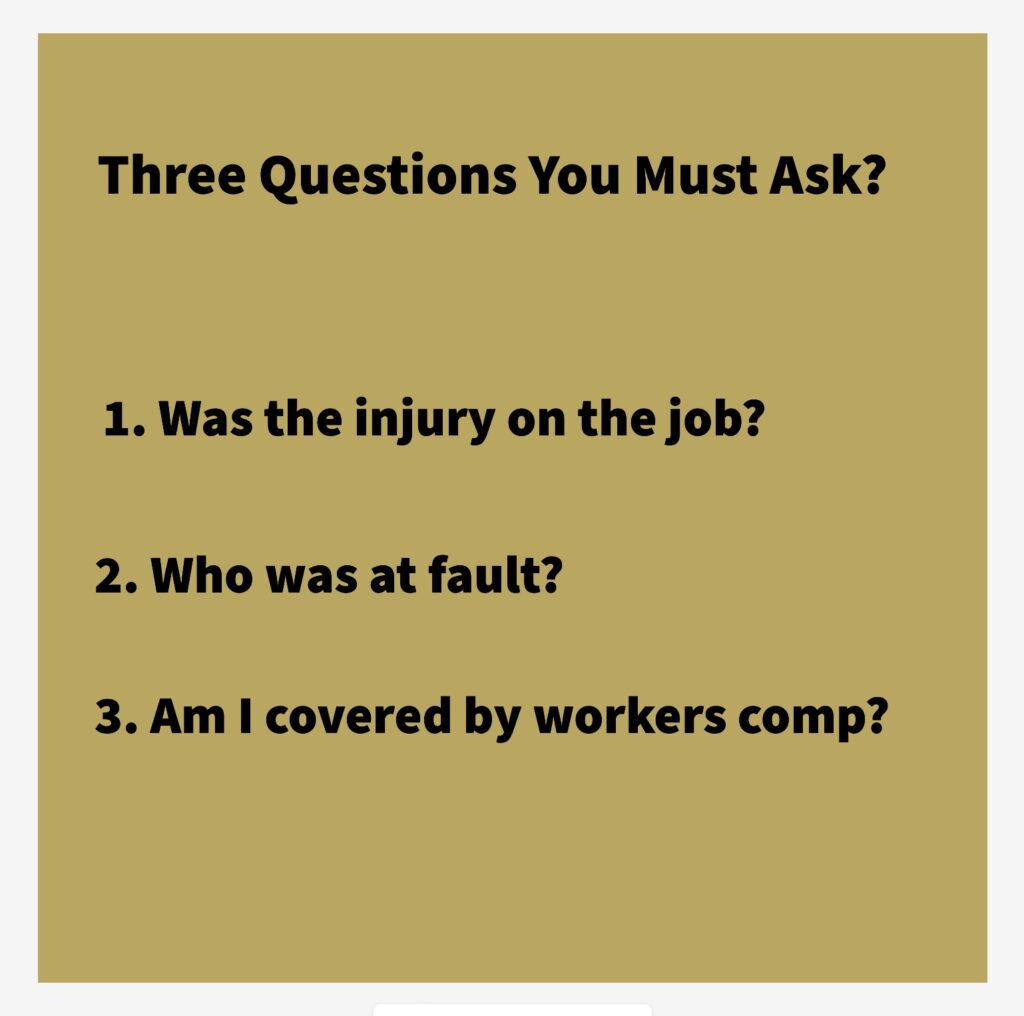Texas Personal Injury or Worker’s Compensation Claim?
This is a question that comes up frequently in our Houston personal injury law practice. Someone is injured on the job and wonders about the appropriate procedure to obtain necessary compensation for their injuries.
Whether the claim is a personal injury or one covered by worker’s compensation, or both, will depend upon the facts and circumstances of the accident.

Generally, on-the-job injuries are personal injuries; if covered by worker’s compensation, a claim against your employer would be a worker’s comp claim.
However, if a 3rd party was a cause of the on-the-job injury, you may be able to pursue the third party with a personal injury lawsuit, in addition to making a worker’s comp claim.
If you were injured on the job and your employer did not have worker’s comp insurance, you may be able to pursue a “non-subscriber” case against your employer. Contact a Houston work injury lawyer for a free consultation. Call (281) 587-1111
You must answer three questions to determine how to proceed with your injury claim.

Texas Worker’s Compensation Claims
in Texas, Worker’s Compensation is available to employers who purchase it. If Worker’s Comp covers you, your case against your employer will be limited to a Worker’s Compensation claim in Texas.
The most significant difference between a personal injury claim and a workers’ compensation claim is that with workers’ compensation, if you are injured on the job, and your employer has workers’ compensation, you do not have to prove fault to collect benefits.
Worker’s Comp Medical Benefits are Generous
With Worker’s Compensation, the injury victim is usually well taken care of from a medical perspective, but human damages, such as pain and suffering, are little to nothing.
Compensation with WC includes weekly benefits, permanent impairment benefits, medical expenses, and rehab.
You Can’t Sue Your Employer in Texas if They Have Comp!
Suppose your employer had workers’ compensation coverage in effect during your accident. In that case, your claims against your employer will be limited to those benefits available under Worker’s Compensation in Texas.
One exception is if the accident was fatal and the employer was grossly negligent. In that situation, you might be able to sue for punitive damages.
In short, you can’t sue your employer for the on-the-job injury; your recourse is the Worker’s Compensation system.
Worker’s Compensation Limits Human Damages.
Most Workers’ Compensation victims with severe injuries are left holding the bag except for their medical expenses, as the statutory scheme does not allow for items of compensation available to other personal injury victims.
For example, with a construction accident, Website Contact will pay medical bills and very little for human damages like pain and suffering. That is where 3rd party cases come in when applicable.
You Don’t Have to Prove Fault with WC.
If Comp covers you, You Don’t Have to Prove Fault by your employer in Texas.
The requirements to be paid from worker’s compensation in Texas are that you were injured on the job and your employer has coverage. Proving fault is not necessary.
Is it Worker’s Comp or a Private Insurance Policy?
Many companies have used an alternative insurer other than Worker’s Compensation to reduce costs.
These plans, if they are not registered as workers’ compensation with the state of Texas, generally do not automatically qualify the employer for the benefits of worker’s compensation immunity because of an accident on the job.
Texas provides a method to determine if your employer had worker’s compensation coverage at the time of your accident. Or you can reach out to the HR department for verification of coverage.
You can contact the State of Texas Worker’s Compensation Commission for questions regarding workers’ compensation, benefits, and claim procedures.
With Private Insurance, Be Careful What You Sign
It is important that the injured worker not sign paperwork without speaking with an attorney about the consequences of such a signature, particularly when dealing with an insurance policy other than WC.
Nonsubscriber Cases Against Your Employer
If your injury occurred on the job, but your employer was not a subscriber to worker’s compensation in Texas, you may be able to bring a “nonsubscriber” case against your employer.
Texas Law on Nonsubscriber Cases
Texas Labor Code Sec. 406.033 covers the law for nonsubscriber cases in Texas.
Texas Labor Code Sec. 406.033 provides:
(a) In an action against an employer by or on behalf of an employee who is not covered by workers’ compensation insurance obtained in the manner authorized by Section 406.003 to recover damages for personal injuries or death sustained by an employee in the course and scope of the employment, it is not a defense that:
(1) the employee was guilty of contributory negligence;
(2) the employee assumed the risk of injury or death; or
(3) the injury or death was caused by the negligence of a fellow employee.
(b) This section does not reinstate or otherwise affect the availability of defenses at common law, including the defenses described by Subsection (a).
(c) The employer may defend the action on the ground that the injury was caused:
(1) by an act of the employee intended to bring about the injury; or
(2) while the employee was in a state of intoxication.
What are the Differences between WC and Texas Nonsubscriber Cases?
The differences between a worker’s compensation claim and a nonsubscriber case against your employer in general are:
- With nonsubscriber cases, you must prove some fault or negligence to your employer.
- With nonsubscriber cases, you are not as limited in damages.
- Nonsubscriber claims likely are not covered by insurance, and collection of damages can sometimes be an issue.
- Contributory negligence (by you) is not a defense for the nonsubscriber.
- Nonsubscriber cases are like personal injury cases (with some exceptions).
Texas Nonsubscriber Questions
Can employees harmed in an accident due to lack of training or poorly maintained equipment be entitled to financial compensation and punitive damages?
Yes, employees harmed in an accident due to lack of training or poorly maintained equipment may be entitled to financial compensation and possibly even punitive damages.
What are the potential legal consequences for employers who fail to meet their obligations in providing a safe work environment?
Employers who fail to meet their obligations in providing a safe work environment can be exposed to legal action.
Does the employer need to enforce provisions for required safety gear?
Yes, the employer is required to enforce provisions for required safety gear.
Should the employer ensure that equipment is safe and maintained?
Yes, the employer should ensure that equipment is safe and properly maintained.
Is the employer required to provide proper training for employees?
Yes, the employer is required to provide proper training for employees.
What are the obligations of the employer in providing a safe work environment?
The employer must provide a safe work environment for their employees.
Is the employer responsible for informing employees about their participation in the workers’ compensation program?
Yes, employers must inform employees whether or not they are participating in the workers’ compensation program.
What are Third-Party Cases After an Injury at Work?
To recover damages in a Texas personal injury case, you must prove that the person who caused the accident owed you a duty and caused you legally recoverable damages. If your injury was caused by the actions of another person (not a co-employee) or your company, you might have a third-party case.
Third-party cases prove that another company or person (not an employee of your employer caused the injury.
Some Common Examples of Personal Injury and Worker’s Compensation
By way of example, if you were injured car accident and someone else is at fault, this would be a personal injury case. (But if you were on the job at the time of the crash and your employer had WC, it may be both a personal injury case against the negligent driver and a WC claim with your employer). In this case, you may recover both worker’s comp and personal injury damages.
Third-Party Personal Injury and Non-Subscriber Claims Require Proving Fault
The personal injury claimant must prove someone else was negligent and at fault . With non-subscriber cases, contributory negligence is no a factor. But the employee must prove some fault on their employer. For on-the-job workers, your employer may have workers’ compensation coverage, which limits your claims against the employer to the workers’ compensation statutory scheme.
However, if another person or company was partly at fault for the on-the-job accident, you may be able to file a personal injury lawsuit against that party. That case is called a third-party claim.
Third-Party Cases in Addition to Worker’s Compensation
If parties other than your employer may have been responsible for the accident, you may be able to sue such parties and not be barred by Worker’s Comp.
A few other examples would be where your injury was caused by a dangerous or defective machine or another person not employed by your company.
These are called “third-party” claims, and victims can simultaneously pursue Worker’s Compensation and third-party cases.
Subrogation or Payback of Comp Benefits
It is noteworthy that Workers’ Compensation in Texas includes statutory subrogation claims. Victims often must repay workers’ compensation out of third-party compensation in personal injury cases.
In short, if you get comp benefits and win damages from a third party, your lawyer must pay worker’s compensation back.
Damages are More Generous with Third-Party Cases
Damages and Workers’ Compensation claims are extremely limited and defined by statute. Damages in personal injury cases are much different because damages are generally determined in an agreed settlement or by a jury.
Personal injury damages include such things as:
* Physical pain
* Disfigurement
* Impairment
* Medical expenses
* Lost wages.
Individuals seriously injured on the job should inquire about the Worker’s Compensation situation with their employer.
Also, consider speaking to a personal injury attorney in Houston regarding whether a third-party claim against others may be possible if you believe another (other than your employer) person or company was at fault.
Contact a Leading Personal Injury Lawyer in Texas
If you’ve been injured on the job in Houston and would like to speak with an attorney about a potential third-party claim, contact us at the Baumgartner Law Firm Personal Injury Lawyers for a no-obligation consultation regarding your rights and options.
Our goal is to maximize in-pocket compensation for you.
While we do not handle workers comp claims, we have been extremely successful with 3rd party lawsuits.
Ask us about our no-fee promise – you will pay us no fee unless we win your case.
Call (281) 587-1111 or Request a Consultation!
Baumgartner Law Firm
6711 Cypress Creek Pkwy, Houston, TX, 77069
Related Resources:
Can I Sue My Own Auto Insurance Company in Texas?
Houston Scaffold Accident Lawyer
Damages for Workplace Injuries in Texas
Falls a Leading Cause of Death in Texas
Steps for Filing a Personal Injury Lawsuit in Texas
Contingency Fees and Houston Personal Injury Cases
What Percentage Do Most Personal Injury Lawyers Take?
How Much Is My Personal Injury Case Worth?
Medical Evidence to Prove a Texas Personal Injury Claim
How Long Does a Personal Injury Case Take in Texas
How Texas Car Accident Injury Claims Are Different With Company Vehicles
